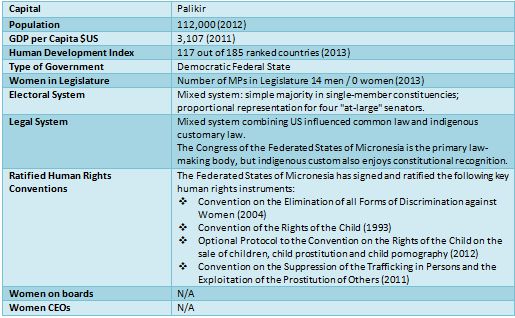Federated States of Micronesia

The Federated States of Micronesia (FSM) encompasses four states – Chuuk, Kosrae, Pohnpei and Yap – spread across the western Pacific Ocean, north of the equator. The 607 islands that make up FSM consist of both low-lying atolls and volcanic island peaks. FSM’s political structure is a result of the break-up of the Trust Territory of the Pacific Islands, which, until the end of World War II, was administered by the United States of America (USA). Along with Republic of Marshall Islands and Palau, FSM negotiated a “Compact of Free Assosciation” with the USA upon independence. FSM’s economy is dominated by the public sector with over 50% of the labour force employed in public administration or state-owned enterprises. The government sector generates 40% of GDP.
Women and the Law
The power to legislate in FSM is divided between the National Congress and the four state parliaments. The legal rights of women are protected under the FSM National Constitution and the constitutions of the four states, all of which prohibit discrimination on the grounds of sex[1]. There is no national legislation criminalising sexual assault, however, each state has identical legislation criminalising both sexual assault with penetration and sexual intercourse with girls under 13.
While the Convention on the Elimination of all forms of Discrimination against Women (CEDAW) has been ratified, a 2004 review indicated that FSM was non-compliant on 61% of the recognised indicators of legal compliance.
In Pohnpei sexual assault is inadmissible if the complainant and offender live together in a voluntary sexual relationship. The common law rule requiring proof of physical resistance in order to establish absence of consent is still applied across the states, as is the rule directing that it is dangerous to convict on victim’s testimony without corroboration. There is no domestic violence or sexual harassment legislation in place and fault-based divorce is practised across all four states.
Customary law in FSM can override civic legislation where there is conflict between them[1].
There is very little data collected regarding the levels of violence against women across FSM, however, there are increasing reports of domestic violence cases and gender-based violence is widely considered to be one of the primary human rights issues facing the country. Incest and child abuse both exist in FSM but are believed to be under-reported due to cultural sensitivities. The government has acknowledged the need for concrete data on the nature and incidence of domestic violence against women (FSM, 2010)[1].
Women and the Economy
Approximately 68% of FSM women and girls over the age of 15 are categorised as economically active and women comprise 14% of the non-agricultural sector. In primary school, the ratio of girls to boys reached 0.96 in 2009 but it is over 100 at secondary and tertiary levels[1].
Paid maternity leave is accessible for employees of the national government only, and, for a shorter period, employees of the Kosrae state government.
The rate of recorded maternal mortality was 0 in 2009 and 90% of births are attended by skilled birth attendants.
Contraceptive prevalence rate is 40% and the adolescent birth rate has halved since 1990, dropping to 42 per 1,000 women.
FSM has a high prevalence of tuberculosis. In 2009 the incidence rate was 157 per 100,000 people, while the prevalence rate was 168 per 100,000 and rising. FSM’s leprosy rate is one of the highest in the Pacific, while HIV infection levels are low but steadily increasing.
Women and the Environment
Annual and seasonal maximum and minimum temperatures have increased in Pohnpei since 1952 at a rate of 0.19oF (0.10°C) per decade. Data since 1950 for Pohnpei shows a clear decreasing trend in annual and wet season rainfall. Satellite data indicates the sea level has risen in FSM by more than 0.39 inches (10mm) a year since 1993. The global average is 0.11-0.14 inches (2.8-3.6mm) a year. It is noted that this higher rate of rise may be related to natural fluctuations caused year-to-year or decade-to-decade by natural phenomena such as the El Nino Southern Oscillation.
FSM, like its neighbours Republic of Marshall Islands, Kiribati and Nauru, is particularly vulnerable to severe weather such as cyclones, tsunamis and tidal surges. The low-lying atolls are the most vulnerable, but all islands are susceptible to coastal erosion – especially in areas of high urbanisation.
UN Women in FSM
Advancing Gender Justice in the Pacific (AGJP) Programme: UN Women continues to build capacity with its government and civil society partners for CEDAW implementation and reporting, particularly when it comes to adopting a harmonised human rights reporting and implementation approach. In terms of women’s political participation, UN Women is undertaking advocacy initiatives through its Empowerment Series events.
Ending Violence against Women (EVAW) Programme: This programme provides stakeholders with access to virtual knowledge platforms, tools and evidence-based resources in order to better equip them with the knowledge and evidence to advocate for strengthened EVAW legislation, improved policies and services for violence against women survivors. Social media tools are also made available to support community mobilisation aimed at ending violence against women and girls, through campaigns such as the United Nations Secretary General’s UNiTE to EVAW and Say NO-UNitE.
Women’s Economic Empowerment (WEE) Programme: As part of this programme, UN Women is providing technical support to the national and local governments in producing knowledge products that give decision-makers improved and comparable evidence on the economic situation for women in FSM.
Increasing Community Resilience through Empowerment of Women to Address Climate Change and Natural Hazards (IREACH) Programme: UN Women supports the incorporation of gender dimensions in strategic documents for disaster risk management and climate change through provision of knowledge products and tools on the gendered implications of climate change and disasters.
[1] UNDAF country assessment